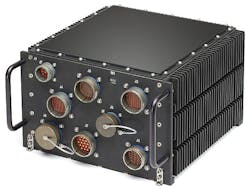Navy asks Northrop Grumman to build as many as 42 avionics mission computers for AH-1Z Viper helicopter
PATUXENT RIVER NAS, Md. – Avionics and flight computer experts at Northrop Grumman Corp. will provide FlightPro Gen III scalable mission computers for the U.S. Marine Corps AH-1Z Viper attack helicopter under terms of a $7.2 million order announced Thursday.
Officials of the U.S. Naval Air Systems Command at Patuxent River Naval Air Station, Md., are asking the Northrop Grumman Mission Systems segment in Woodland Hills, Calif., to provide as many as 42 technical refresh mission computers for the AH-1Z, including trainer units and spare units.
The Northrop Grumman Gen III mission computers are the heart of the company's integrated avionics system that powers the glass cockpit avionics of the Bell AH-1Z and UH-1Y helicopters.
The conduction-cooled Gen III mission computer has a ruggedized 6U VME PowerPC-based single board computer. Interfaces include Fast Ethernet, four serial ports, parallel I/O, and built-in-test. It has a standard partitioned real-time operating system called INTEGRITY-178 tuMP for multicore architectures from Green Hills Software in Santa Barbara, Calif., with ARINC 653 and POSIX support.
Related: Navy picks open-systems avionics flight computers from General Dynamics for combat jets
The the AH-1Z Venom mission computer's standard configuration also includes a quad channel 1553 mezzanine card, high-speed serial card, digital I/O module with eight channels of opto-coupled discrete inputs, eight channels of opto-coupled discrete outputs, and 16 channels of general-purpose bi-directional discretes that can be programmed individually as embedded computing outputs or inputs.
The flight computers use 28-volt DC or 115-volt AC three-phase 400 Hz input power, measure 13.61 by 11.5 by 7.55 inches, and weigh 30.4 pounds. The computers have rated 3,200 hours mean time between failures.
The Gen III computer software is RTCA DO-178C compliant, has ARINC-653 partitioning for safety and security, and complies with the Modular Open Systems Architecture (MOSA) standard. The software is aligned with the Future Airborne Capability Environment (FACE) technical standard, has hardware-independent application software developed to MIL-STD-498, under MIL-STD-882C safety program environmental qualification.
Flight computer hardware is designed to MIL-STD-461D for electro-magnetic compatibility, and is tested to MIL-STD-462 and MIL-STD 810E. FlightPro is conduction cooled, and represents “Quiet Cockpit Technology,” Northrop Grumman officials say.
Dual mission computers are part of Northrop Grumman's integrated avionics aboard the AH-1Z and UH-1Y. The mission computers provide centralized control of the helicopter avionics, displays, situational awareness, and health monitoring.
Additionally, the helicopter avionics and mission computers can accommodate future system upgrades; rapid insertion of new technologies; and integration of other avionics, communications, and survivability equipment. Northrop Grumman also provides the operational flight program software that controls the AH-1Z and UH-1Y avionics.
The H-1 Upgrade program is replacing aging AH-1W and UH-1N helicopters with upgraded UH-1Y and AH-1Z aircraft to enhance commonality, reliability, and maintainability. The upgraded helicopters have 100 percent software commonality through Northrop Grumman's IAS and the same operational flight program.
For more information contact Northrop Grumman Mission Systems online at www.northropgrumman.com, or Naval Air Systems Command at www.navair.navy.mil.
Ready to make a purchase? Search the Military & Aerospace Electronics Buyer's Guide for companies, new products, press releases, and videos

